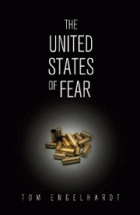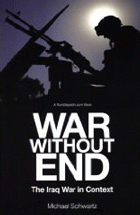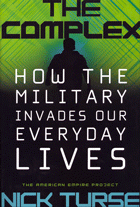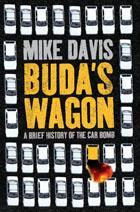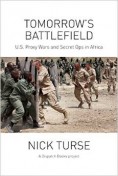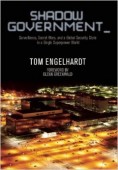[Note for TomDispatch Readers: This website will be taking May Day off. The next post will be on Tuesday, May 3rd. Tom]
In a Greater Middle East in which one country after another has been plunged into chaos and possible failed statehood, two rival nations, Iran and Saudi Arabia, have been bedrock exceptions to the rule. Iran, at the moment, remains so, but the Saudi royals, increasingly unnerved, have been steering their country erratically into the region’s chaos. The kingdom is now led by a decrepit 80-year-old monarch who, in commonplace meetings, has to be fed his lines by teleprompter. Meanwhile, his 30-year-old son, Deputy Crown Prince Mohammed bin Salman, who has gained significant control over both the kingdom’s economic and military decision-making, launched a rash anti-Iranian war in Yemen, heavily dependent on air power. It is not only Washington-backed but distinctly in the American mode of these last years: brutal yet ineffective, never-ending, a boon to the spread of terror groups, and seeded with potential blowback.
Meanwhile, in a cheap-oil, belt-tightening moment, in an increasingly edgy country, the royals are reining in budgets and undermining the good life they were previously financing for many of their citizens. The one thing they continue to do is pump oil -- their only form of wealth -- as if there were no tomorrow, while threatening further price-depressing rises in oil production in the near future. And that’s hardly been the end of their threats. While taking on the Iranians (and the Russians), they have also been lashing out at the local opposition, executing a prominent dissident Shiite cleric among others and even baring their teeth at Washington. They have reportedly threatened the Obama administration with the sell-off of hundreds of billions of dollars in American assets if a bill, now in Congress and aimed at opening the Saudis to American lawsuits over their supposed culpability for the 9/11 attacks, were to pass. (It would, however, be a sell-off that could hurt the Saudis more than anyone.) Even at the pettiest of levels, on Barack Obama's recent arrival in Saudi Arabia for a visit with King Salman, they essentially snubbed him, a first for a White House occupant. All in all, a previously sure-footed (if extreme) Sunni regime seems increasingly unsettled; in fact, it has something of the look these days of a person holding a gun to his own head and threatening to pull the trigger. In other words, in a region already aflame, the Saudis seem to be tossing... well, oil onto any fire in sight.
And in a way, it's little wonder. The very basis for the existence of the Saudi royals, their staggering oil reserves, is under attack -- and not by the Iranians, the Russians, or the Americans, but as TomDispatch energy specialist Michael Klare explains, by something so much larger: the potential ending of the petroleum way of life. Tom
Debacle at Doha
The Collapse of the Old Oil Order
By Michael T. KlareSunday, April 17th was the designated moment. The world’s leading oil producers were expected to bring fresh discipline to the chaotic petroleum market and spark a return to high prices. Meeting in Doha, the glittering capital of petroleum-rich Qatar, the oil ministers of the Organization of the Petroleum Exporting Countries (OPEC), along with such key non-OPEC producers as Russia and Mexico, were scheduled to ratify a draft agreement obliging them to freeze their oil output at current levels. In anticipation of such a deal, oil prices had begun to creep inexorably upward, from $30 per barrel in mid-January to $43 on the eve of the gathering. But far from restoring the old oil order, the meeting ended in discord, driving prices down again and revealing deep cracks in the ranks of global energy producers.
It is hard to overstate the significance of the Doha debacle. At the very least, it will perpetuate the low oil prices that have plagued the industry for the past two years, forcing smaller firms into bankruptcy and erasing hundreds of billions of dollars of investments in new production capacity. It may also have obliterated any future prospects for cooperation between OPEC and non-OPEC producers in regulating the market. Most of all, however, it demonstrated that the petroleum-fueled world we’ve known these last decades -- with oil demand always thrusting ahead of supply, ensuring steady profits for all major producers -- is no more. Replacing it is an anemic, possibly even declining, demand for oil that is likely to force suppliers to fight one another for ever-diminishing market shares.
[Note for TomDispatch Readers: Remember that Rebecca Gordon’s superb new book, American Nuremberg: The U.S. Officials Who Should Stand Trial for Post-9/11 War Crimes, is still on offer from TD. For a donation of $100 or more ($125 if you live outside the United States), you can get a signed, personalized copy of it for yourself and lend this website a distinct helping hand. Check out the details at our donation page. Tom]
The Real Meaning of Donald Trump
He’s a Sign of American Decline (Just Not in the Way You Think)
By Tom Engelhardt
"Low-energy Jeb." "Little Marco." "Lyin’ Ted." "Crooked Hillary." Give Donald Trump credit. He has a memorable way with insults. His have a way of etching themselves on the brain. And they’ve garnered media coverage, analysis, and commentary almost beyond imagining. Memorable as they might be, however, they won’t be what last of Trump’s 2016 election run. That’s surely reserved for a single slogan that will sum up his candidacy when it’s all over (no matter how it ends). He arrived with it on that Trump Tower escalator in the first moments of his campaign and it now headlines his website, where it's also emblazoned on an array of products from hats to t-shirts.
You already know which line I mean: “Make America Great Again!” With that exclamation point ensuring that you won’t miss the hyperbolic, Trumpian nature of its promise to return the country to its former glory days. In it lies the essence of his campaign, of what he’s promising his followers and Americans generally -- and yet, strangely enough, of all his lines, it’s the one most taken for granted, the one that’s been given the least thought and analysis. And that’s a shame, because it represents something new in our American age. The problem, I suspect, is that what first catches the eye is the phrase “Make America Great” and then, of course, the exclamation point, while the single most important word in the slogan, historically speaking, is barely noted: “again.”
With that “again,” Donald Trump crossed a line in American politics that, until his escalator moment, represented a kind of psychological taboo for politicians of any stripe, of either party, including presidents and potential candidates for that position. He is the first American leader or potential leader of recent times not to feel the need or obligation to insist that the United States, the “sole” superpower of Planet Earth, is an “exceptional” nation, an “indispensable” country, or even in an unqualified sense a “great” one. His claim is the opposite. That, at present, America is anything but exceptional, indispensable, or great, though he alone could make it “great again.” In that claim lies a curiosity that, in a court of law, might be considered an admission of guilt. Yes, it says, if one man is allowed to enter the White House in January 2017, this could be a different country, but -- and in this lies the originality of the slogan -- it is not great now, and in that admission-that-hasn’t-been-seen-as-an-admission lies something new on the American landscape.
Donald Trump, in other words, is the first person to run openly and without apology on a platform of American decline. Think about that for a moment. “Make America Great Again!” is indeed an admission in the form of a boast. As he tells his audiences repeatedly, America, the formerly great, is today a punching bag for China, Mexico... well, you know the pitch. You don’t have to agree with him on the specifics. What’s interesting is the overall vision of a country lacking in its former greatness.
[Note for TomDispatch Readers: At this website, the book offers are coming fast and furious these days. Think of it as a late winter and spring flurry. The latest is for a new book by a TomDispatch regular we much admire: Rebecca Gordon. She’s written a particularly readable volume with a well-deserved hot-button title: American Nuremberg: The U.S. Officials Who Should Stand Trial for Post-9/11 War Crimes. Her piece today demonstrates just why such trials were justified (and why, of course, for the leaders of the “sole superpower” they will never happen). For a donation of $100 or more ($125 if you live outside the United States), you can get a signed, personalized copy for yourself and lend this website a helping hand staying afloat in a crazed universe. Check out the details at our donation page. Tom]
Let’s take a moment to think about the ultimate strangeness of our American world. In recent months, Donald Trump and Ted Cruz have offered a range of hair-raising suggestions: as president, one or the other of them might order the U.S. military and the CIA to commit acts that would include the waterboarding of terror suspects (or “a hell of a lot worse”), the killing of the relatives of terrorists, and the carpet bombing of parts of Syria. All of these would, legally speaking, be war crimes. This has caused shock among many Americans in quite established quarters who have decried the possibility of such a president, suggesting that the two of them are calling for outright illegal acts, actual “war crimes,” and that the U.S. military and others would be justified in rejecting such orders. In this context, for instance, CIA Director John Brennan recently made it clear that no Agency operative under his command would ever waterboard a suspect in response to orders of such a nature from a future president. ("I will not agree to carry out some of these tactics and techniques I've heard bandied about because this institution needs to endure.")
These acts, in other words, are considered beyond the pale when Donald Trump suggests them, but here’s the strangeness of it all: what The Donald is only mouthing off about, a perfectly real American president (and vice president and secretary of defense, and so on) actually did. Among other things, under the euphemistic term “enhanced interrogation techniques,” they ordered the CIA to use classic torture practices including waterboarding (which, in blunter times, had been known as “the water torture”). They also let the U.S. military loose to torture and abuse prisoners in their custody. They green-lighted the CIA to kidnap terror suspects (who sometimes turned out to be perfectly innocent people) off the streets of cities around the world, as well as from the backlands of the planet, and transported them to the prisons of some of the worst torture regimes or to secret detention centers (“black sites”) the CIA was allowed to set up in compliant countries. In other words, a perfectly real administration ordered and oversaw perfectly real crimes. (Its top officials even reportedly had torture techniques demonstrated to them in the White House.)
At the time, the CIA fulfilled its orders to a T and without complaint. A lone CIA officer spoke out publicly in opposition to such a program and was jailed for disclosing classified information to a journalist. (He would be the only CIA official to go to jail for the Agency’s acts of torture.) At places like Abu Ghraib, the military similarly carried out its orders without significant complaint or resistance. The mainstream media generally adopted the euphemism “enhanced interrogation techniques” or “harsh techniques” in its reporting -- no “torture” or “war crimes” for them then. And back in the post-2001 years, John Brennan, then deputy executive director of the CIA, didn’t offer a peep of protest about what he surely knew was going on in his own agency. In 2014, in fact, as its director he actually defended such torture practices for producing “intelligence that helped thwart attack plans, capture terrorists, and save lives.” In addition, none of those who ordered or oversaw torture and other criminal behavior (a number of whom would sell their memoirs for millions of dollars) suffered in the slightest for the acts that were performed on their watch and at their behest.
To sum up: when Donald Trump says such things it’s a future nightmare to be called by its rightful name and denounced, as well as rejected and resisted by military and intelligence officials. When an American president and his top officials actually did such things, however, it was another story entirely. Today, TomDispatch regular Rebecca Gordon catches the nightmarish quality of those years, now largely buried, in the grim case of a single mistreated human being. It should make Americans shudder. She has also just published a new book, American Nuremberg: The U.S. Officials Who Should Stand Trial for Post-9/11 War Crimes, that couldn’t be more relevant. It’s a must-read for a country conveniently without a memory. Tom
The Al-Qaeda Leader Who Wasn’t
The Shameful Ordeal of Abu Zubaydah
By Rebecca GordonThe allegations against the man were serious indeed.
* Donald Rumsfeld said he was “if not the number two, very close to the number two person” in al-Qaeda.
* The Central Intelligence Agency informed Assistant Attorney General Jay Bybee that he “served as Usama Bin Laden’s senior lieutenant. In that capacity, he has managed a network of training camps... He also acted as al-Qaeda’s coordinator of external contacts and foreign communications.”
* CIA Director Michael Hayden would tell the press in 2008 that 25% of all the information his agency had gathered about al-Qaeda from human sources “originated” with one other detainee and him.
* George W. Bush would use his case to justify the CIA’s “enhanced interrogation program,” claiming that “he had run a terrorist camp in Afghanistan where some of the 9/11 hijackers trained” and that “he helped smuggle al-Qaeda leaders out of Afghanistan” so they would not be captured by U.S. military forces.
None of it was true.
And even if it had been true, what the CIA did to Abu Zubaydah -- with the knowledge and approval of the highest government officials -- is a prime example of the kind of still-unpunished crimes that officials like Dick Cheney, George Bush, and Donald Rumsfeld committed in the so-called Global War on Terror.
In our part of the world, it’s not often that potential “collateral damage” speaks, but it happened last week. A Pakistani tribal leader, Malik Jalal, flew to England to plead in a newspaper piece he wrote and in media interviews to be taken off the Obama White House’s “kill list.” (“I am in England this week because I decided that if Westerners wanted to kill me without bothering to come to speak with me first, perhaps I should come to speak to them instead.”) Jalal, who lives in Pakistan’s tribal borderlands, is a local leader and part of a peace committee sanctioned by the Pakistani government that is trying to tamp down the violence in the region. He believes that he’s been targeted for assassination by Washington. (Four drone missiles, he claims, have just missed him or his car.) His family, he says, is traumatized by the drones. “I don’t want to end up a ‘Bugsplat’ -- the ugly word that is used for what remains of a human being after being blown up by a Hellfire missile fired from a Predator drone,” he writes. “More importantly, I don’t want my family to become victims, or even to live with the droning engines overhead, knowing that at any moment they could be vaporized.”
Normally, what “they” do to us, or our European counterparts (think: Brussels, Paris, or San Bernardino), preoccupies us 24/7. What we do to “them” -- and them turns out to be far more than groups of terrorists -- seldom touches our world at all. As TomDispatch readers know, this website has paid careful attention to the almost 300 wedding celebrants killed by U.S. air power between late 2001 and the end of 2013 -- eight wedding parties eviscerated in three countries (Iraq, Afghanistan, and Yemen). These are deaths that, unlike the 14 Americans murdered in San Bernardino, the 32 Belgians and others killed in Brussels, and the 130 French and others slaughtered in Paris, have caused not even a ripple here (though imagine for a second the reaction if even a single wedding, no less eight of them and hundreds of revelers, had been wiped out by a terror attack in the U.S. in these years).
Any sense of sadness or regret for Washington’s actions, when it comes to the many killed, wounded, or traumatized in its never-ending, implacable, and remarkably unsuccessful war on terror, is notable mainly for its absence from our world. So it’s an extraordinary moment when any Americans -- no less a group that has been deeply involved in prosecuting the drone war on terror -- publicly expresses empathy for the “collateral damage” inflicted in that ongoing conflict. That's why TomDispatch regular Pratap Chatterjee brings genuine news today from the heart of America’s drone wars, from those who should best be able to assess the grim reality of just what Washington has been doing in our name. Tom
Drone Whistleblowers Step Out of the Shadows
In Washington’s Drone Wars, Collateral Damage Comes Home
By Pratap ChatterjeeIn a trio of recent action-packed movies, good guys watch terrorists mingling with innocent women and children via real-time video feeds from halfway across the world. A clock ticks and we, the audience, are let in on the secret that mayhem is going to break loose. After much agonized soul-searching about possible collateral damage, the good guys call in a missile strike from a U.S. drone to try to save the day by taking out a set of terrorists.
Such is the premise of Gavin Hood’s Eye in the Sky, Andrew Niccol’s Good Kill, and Rick Rosenthal’s Drones. In reality, in Washington’s drone wars neither the “good guys” nor the helpless, endangered villagers under those robotic aircraft actually survive the not-so secret drone war that the Obama administration has been waging relentlessly across the Greater Middle East -- not, at least, without some kind of collateral damage. In addition to those they kill, Washington’s drones turn out to wound (in ways both physical and psychological) their own operators and the populations who live under their constant surveillance. They leave behind very real victims with all-too-real damage, often in the form of post-traumatic stress disorder on opposite sides of the globe.
“Sometimes I am so sad that my heart wants to explode,” an Afghan man says, speaking directly into the camera. “When your body is intact, your mind is different. You are content. But the moment you are wounded, your soul gets damaged. When your leg is torn off and your gait slows, it also burdens your spirit.” The speaker is an unnamed victim of a February 2010 drone strike in Uruzgan, Afghanistan, but he could just as easily be an Iraqi, a Pakistani, a Somali, or a Yemeni. He appears in National Bird, a haunting new documentary film by Sonia Kennebeck about the unexpected and largely unrecorded devastation Washington’s drone wars leave in their wake. In it, the audience hears directly from both drone personnel and their victims.
With only nine months to go, in the fashion of modern presidents, Barack Obama is already planning his post-presidential library, museum, and foundation complex. Such institutions only seem to grow more opulent and imperial as the years and administrations pass. Obama’s will reportedly leave the $300 million raised for George W. Bush’s version of the same in the dust. The aim is to create at least an $800 million and possibly billion-dollar institution. With his post-Oval Office future already in view and his presidency nearly history, his “legacy” has clearly been on his mind of late. And when it comes to foreign policy, he definitely has some accomplishments to brag about. The two most obvious are the Iran nuclear deal and the opening to Cuba. In their own ways, both could prove game changers, breaking with venomous relations that lasted, in the case of Iran, for more than three and a half decades, and in the case of Cuba, for more than half a century.
You can already imagine the exhibits celebrating them at the Barack Obama Presidential Center to be built on the south side of Chicago. But it's hard not to wonder how that institution will handle the three major foreign policy promises the new president made in the distant days of 2008-2009. After all, he was, in part, swept into the presidency on a blunt promise to end George W. Bush’s catastrophic war in Iraq. (“So when I am Commander-in-Chief, I will set a new goal on Day One: I will end this war.”) Nine years later, he’s once again taken this country into the Big Muddy of an Iraq War, either the third or fourth of them in the last five presidencies (depending on whether you count the Reagan administration support for Saddam Hussein’s war with Iran in the 1980s). At this moment, having just dispatched B-52s, the classic Vietnam-era carpet-bombing plane of choice (Ted Cruz must be thrilled!) to Qatar as part of that war effort, and being on a mission-creep path ever deeper into what can only be called the Iraq quagmire, we're likely to be talking about a future museum exhibit from hell.
But it won’t begin to match the special exhibit that will someday undoubtedly explore the president’s heartfelt promise to work to severely curtail the American and global nuclear arsenals and put the planet on a path to -- a word that had never previously hovered anywhere near the Oval Office -- nuclear abolition. The president’s disarmament ambitions were, in fact, significantly responsible for his 2009 Nobel Prize, an honor that almost uniquely preceded any accomplishments. Now, the same man is presiding over a planned three-decade, trillion-dollar renovation and modernization of that same arsenal, including the development of an initial generation of “smart” nukes, potentially first-use weapons. It’s certainly been a unique path for our first outright anti-nuclear president to take and deserves a special place of (dis)honor at the future Obama center.
Barring surprising developments in the coming months, however, no exhibit is likely to be more striking or convoluted than the one that will have to be dedicated to the "closing" of Guantánamo, the notorious offshore, Bush-era prison camp. After all, as TomDispatch regular Karen Greenberg, author of Rogue Justice: The Making of the Security State, a striking soon-to-be-published anatomy of post-9/11 national security state mania, points out today, the closing of Guantánamo within a year represented one of the president’s first promises on entering the Oval Office. Unless somehow he succeeds in shutting Gitmo down over fierce Republican congressional opposition in these final months, it could prove the pièce de résistance of his future museum. Tom
Still in the Bush Embrace
What Really Stands in the Way of Closing Guantánamo
By Karen J. GreenbergCan you believe it? We’re in the last year of the presidency of the man who, on his first day in the Oval Office, swore that he would close Guantánamo, and yet it and everything it represents remains part of our all-American world. So many years later, you can still read news reports on the ongoing nightmares of that grim prison, ranging from detention without charge to hunger strikes and force feeding. Its name still echoes through the halls of Congress in bitter debate over what should or shouldn’t be done with it. It remains a global symbol of the worst America has to offer.


